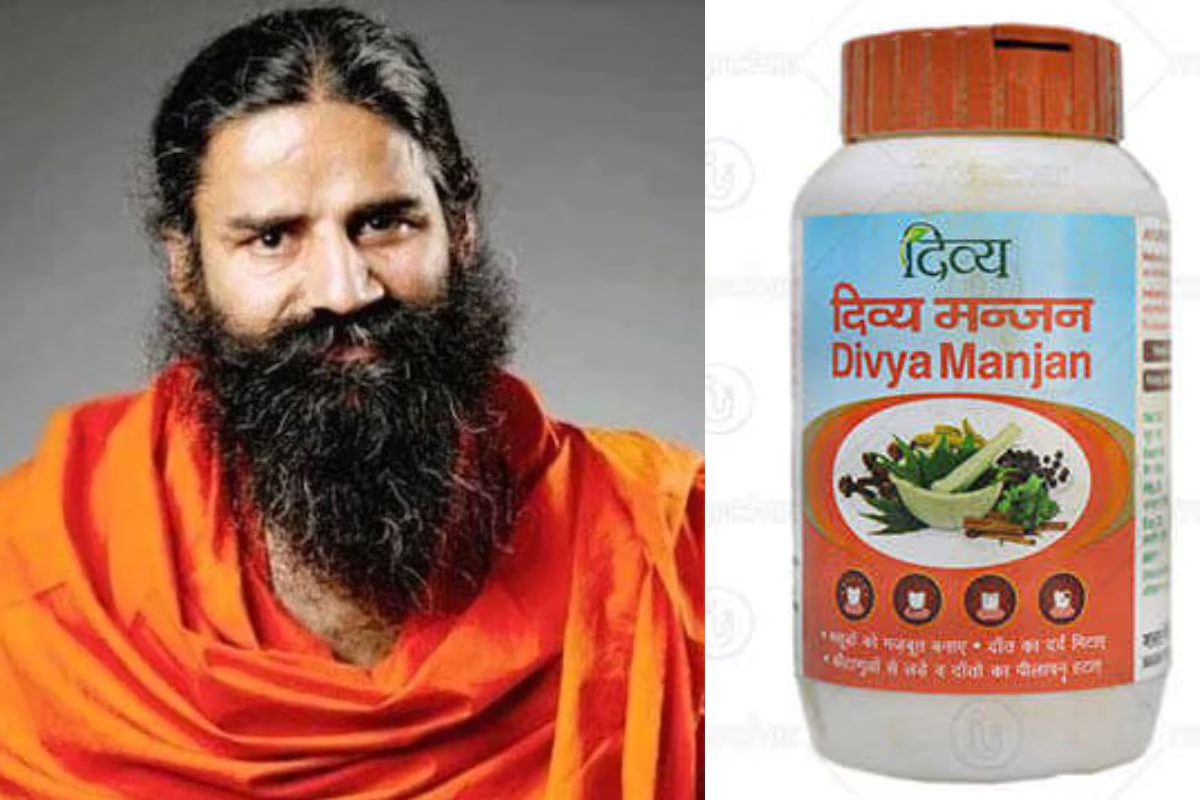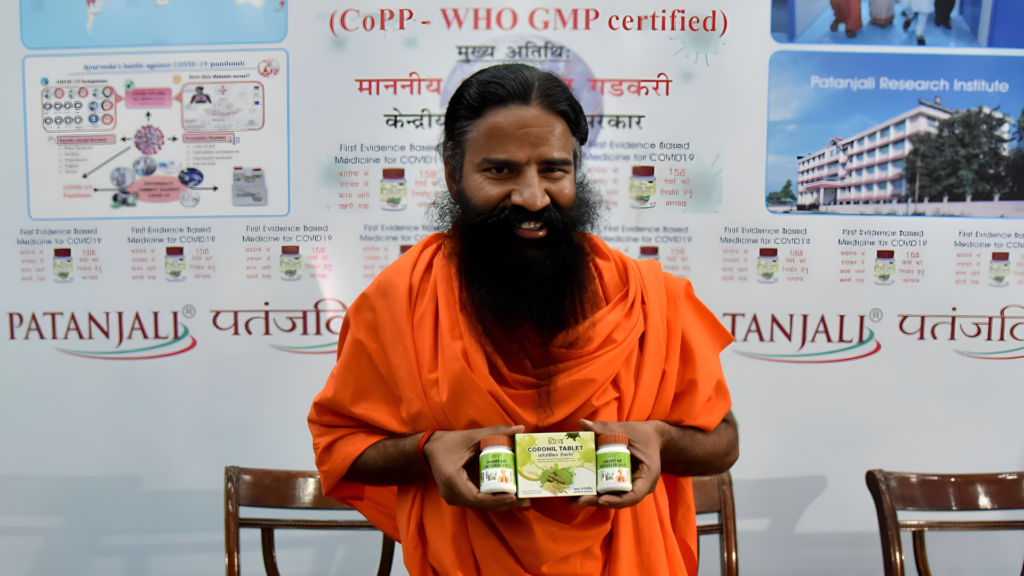Patanjali Ayurved Limited, led by yoga guru Ramdev, is once again facing legal challenges. The Delhi High Court has issued notices to the Centre, the Food Safety and Standards Authority of India (FSSAI), and Patanjali Ayurved in response to a petition alleging the misbranding of its "Divya Dant Manjan" dental care product.
The petition, filed by lawyer Yatin Sharma, argues that the product, which is labeled as vegetarian, contains a fish-derived ingredient, raising concerns over transparency and compliance with existing regulations. This controversy comes amidst a series of legal troubles for Patanjali, including recent contempt proceedings in the Supreme Court related to misleading advertisements.

Allegations of Misbranding: The Case of "Divya Dant Manjan"
- The Petitioner's Claims
The controversy centers around the claim that "Divya Dant Manjan," a dental care product sold by Patanjali Ayurved, is misleadingly marketed as vegetarian. The product packaging displays a green dot, a symbol widely recognized in India to indicate that a product is suitable for vegetarians. However, a petition filed by lawyer Yatin Sharma contends that the product contains "samudraphen" (sepia officinalis), a compound derived from fish, making it non-vegetarian.
According to the petition, this discrepancy constitutes "misbranding" under the Drugs and Cosmetics Act. Although the law does not specifically require drugs to be labeled as vegetarian or non-vegetarian, the use of the green dot — a symbol indicating vegetarian status — when the product contains a fish-based ingredient could be misleading and in violation of consumer protection standards.
- Impact on Religious Beliefs and Consumer Rights
Sharma, represented by advocates Swapnil Chaudhary and Prashant Gupta, emphasized the emotional and psychological distress caused to consumers, particularly those who adhere to strict vegetarian diets due to religious beliefs. He argued that the misrepresentation caused his family to unknowingly consume a non-vegetarian product, violating their dietary principles.
The petition also highlighted that yoga guru Ramdev, in a YouTube video, admitted that "samudraphen" is an animal-based ingredient, contradicting the product's vegetarian labeling. The petitioner seeks redress for the distress caused and urges greater transparency in product labeling and marketing practices.

Legal Proceedings and Responses
- High Court Notice and Upcoming Hearing
Justice Sanjeev Narula of the Delhi High Court issued notices to the Centre, FSSAI, Patanjali Ayurved, Divya Pharmacy, and other related parties, asking them to clarify their stand on the alleged misbranding. The case is scheduled to be heard in November, giving all parties time to prepare their responses.
- Admission of Non-Vegetarian Content
In an unexpected twist, Baba Ramdev, the co-founder of Patanjali, admitted in a YouTube video that "Samudraphen" is indeed an animal-based ingredient. Despite this admission, the product continues to be marketed as vegetarian, raising further questions about Patanjali's compliance with regulatory standards.

Recent Contempt Proceedings: A Pattern of Legal Challenges
- Contempt Proceedings Against Ramdev and Patanjali
In a separate but related development, the Supreme Court of India recently closed contempt proceedings against Patanjali, its key aide Balkrishna, and Ramdev. The contempt case originated from allegations that the company had violated previous court orders concerning misleading advertisements about its products.
In November 2023, the Supreme Court had issued a stern warning to Patanjali, instructing it to comply with legal standards and to refrain from making misleading claims regarding the medicinal benefits of its products. The court found that Patanjali initially failed to adhere to these directives, which led to the initiation of contempt proceedings. The case also involved accusations of misinformation related to the Covid-19 vaccination drive and traditional medicine.
However, the Supreme Court eventually accepted an unqualified apology from Patanjali and its representatives, deciding to close the contempt case while cautioning the company against any future violations.
- Supreme Court Stays Central Notification on Misleading Advertisements
Just days before the Delhi High Court's intervention, the Supreme Court stayed a Central notification that sought to remove a rule against misleading advertisements of ayurvedic and unani drugs. This decision came in response to a plea filed in 2022 by the Indian Medical Association (IMA), which alleged that Patanjali and Ramdev were involved in a smear campaign against the Covid-19 vaccination drive and modern medicine.
The court's decision to stay the notification demonstrates a growing concern about the regulation and advertising of alternative medicines, which have gained significant popularity in recent years but are often criticized for lacking rigorous scientific validation.

Broader Implications for Patanjali and the Ayurvedic Industry
The ongoing legal battles highlight several critical issues facing Patanjali Ayurved and the broader ayurvedic and herbal products industry:
-
Regulatory Compliance: The cases underscore the need for stricter regulatory oversight to ensure that products are accurately labeled and marketed, particularly when they cater to specific dietary or religious preferences.
-
Consumer Protection: The controversy raises questions about consumer rights and the importance of transparency in product information. Consumers rely on labels like the green dot to make informed choices, and misleading information can lead to ethical and emotional distress, especially for those with strong dietary restrictions.
-
Advertising Practices: The repeated allegations against Patanjali for misleading advertisements reflect broader concerns about the marketing practices of companies in the ayurvedic sector. As alternative medicine gains popularity, there is a pressing need to balance promotion with factual accuracy to maintain public trust.
-
Judicial Intervention: The involvement of the judiciary in these matters indicates a proactive approach to safeguarding consumer interests and ensuring that companies comply with existing laws and regulations.
The ongoing legal scrutiny faced by Patanjali Ayurved Limited over its "Divya Dant Manjan" product and previous allegations of misleading advertising practices reveals the complex regulatory landscape in which the company operates. As the case progresses, it may set a precedent for how the Indian legal system addresses issues of misbranding, consumer protection, and transparency in the rapidly growing market for ayurvedic and herbal products. The outcome could have far-reaching implications not only for Patanjali but also for the broader industry and consumers who rely on these products for their health and wellness needs.
With inputs from agencies
Image Source: Multiple agencies
© Copyright 2024. All Rights Reserved Powered by Vygr Media.





















